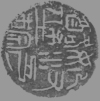|
Sir Byron Bennington Pinwood would be among the Commonwealth's dullest and least distinguished dilettante-naturalists of the 19th century if it hadn't been for his witnessing of the infamous 1897 Black Fire of Simcoe. While you may have heard certain versions of the story from elder locals or pieced together from scraps in the possession of the Historical Society, no recounting is more complete or authoritative than Pinwood's own very pompous first-hand notes.
He had come to the colonies in search of the elusive Boreal Lutin (known sometimes as the Northern Leprechaun or Snowy Brownie) which Pinwood hypothesized was a kind of degenerate Sasquatch native to Huronia. In order to trap it he capitalized on the creature's alleged aversion to salt by creating a labyrinth of sodium trails throughout a swath of Crown forest west of Cook's Bay. As a result, Sir Pinwood was trampled by a herd of salt-craving deer. Delirious, bleeding and thirsty, Pinwood managed to wander out to Yonge Street's muck where he was run down by a passing carriage.
The driver took him to a nearby farm for medical treatment, which was dutifully undertaken by one Mrs. Elspeth Warnica whom had served previously as a nurse in the First Boer War. She expertly applied a splint to Pinwood's broken leg, carefully tied gauze around his head wounds then covered his chest in a standard dose of leeches. Impressed unduly by his time in the elements, however, Pinwood had caught a chill that rattled him to the bone. "Please, dear woman, mightn't we pile the fire higher?"
"I'm quite sure the fires burn very high at your estate," she replied tartly, "but we are simple people here, sir, and poor. Wood doesn't grow on trees."
The nobleman was very insistent and Mrs. Warnica, mindful of her duties as hostess to the injured, at last consented to feed a week's worth of wood into the fireplace until it veritably roared. The intense glow of the conflagration attracted all the farmhands and children, tired and numb after a long day of winter work. Each of them in turn came to find a place in front of the fire, to loosen boots and flex frozen toes. The children solemnly knocked their pipes against the bricks and packed them while the farmhands squealed and giggled and pretending at fighting one another. Pinwood called for more wood.
"If you pack too much fuel into a fire it comes full circle and burns cold," said a Wendat boy hired to work to sharpen tools. "My great-uncle saw it once, after a spirit walk. Fire punishes greed."
By all reports Pinwood rolled his eyes. "I'm sure I know the type of spirits your uncle was enjoying," he said in a mocking tone. "And your nation has never been particularly renowned for its comprehension of the modern Newtonian scientific reality."
The Wendat wanted to call the Briton a "filthy racist" but since the term hadn't yet been coined he satisfied himself with a simple punch in the mouth. Unable to retaliate due to being wrapped in a blanket, Pinwood had no recourse but to fall down.
Fearing a beating from Mr. Warnica the boy fled the farmhouse, but on his way past the hearth he paused to mutter an incantation. None present was able to discern the words he used, but it is agreed that the tongue of his utterance was probably Old Huron. Several of those there that night were sure it was a curse.
From Pinwood's journal: "Affronted by an Indian rapscallion whose retort was to spit in the hearth to summon, the softest-headed of us might imagine, some spectre of the forgotten world to bite our toes whilst we sleep. An hilarious exercise in folly & primitivism."
The farmhouse door slammed and a chill descended upon the remaining company. Pinwood rubbed his jaw ruefully. "Another log is called for, I should think."
When the good Mrs. Warnica approached with more wood she found herself repulsed by a frigid air. The source of the draft could not be discerned: the door was closed tight and no window uncovered or ajar. Little by little it became apparent that the cold was emanating directly from the fire itself. The flames licked as high and as enthusiastically as before but now, with a sudden guttering, their colour faded from a golden glow to a somber, inky black.
The smith was the first to cross himself and bid goodnight to the company. The horseman followed next with apologies and furtive glances at the hearth. Every hand was begging off now, expressions uneasy. Pinwood scoffed. "It's a trick of convection, an unlikely relation between wind and chimney," he snorted; "you superstitious fools! The laws of thermodynamics will restore the fire's familiar warmth presently. Just wait."
The black flames danced. Every ounce of heat seemed to drain from the room. The stones of the fireplace whitened as they were covered in sublimated frost, then cracked from thermal shock with a series of surprising bangs. "The fire, sir!" cried Mrs. Warnica; "its heat has turned inside-out!"
"Nonsense," declared Pinwood. "There's no such thing as an anti-flame."
"Children, get out of here!" she cried.
"What's called for in these sorts of circumstances," he lectured his hostess, "is a stiff upper lip."
Pinwood's journal shows that despite his apparent skepticism within the privacy of his own notes he jumps to more maverick conclusions -- that this frigid fire is indeed the hearth-counterpart of Pierre-Simon Laplace's famously ridiculed 1796 idea of "black stars" which rob rather than contribute energy to the universe. This reference is rendered in an unsteady hand, from haste or from temperature we can only guess.
What we do know is that seconds after Mrs. Warnica fled out into the snowy night the family farmhouse collapsed in upon itself with a great thunderous clap. The air nearest the calamity was flash-frozen into a vitreous spheroid with great gobs of liquefied nitrogen oozing from its bounds -- the very atmosphere had turned to glass. The sudden mobility of the material's electrons was sufficient to briefly turn the entire glittering implosion into a giant battery, its discharge immolating every ice to steam in a single blinding pulse of light.
Sir Pinwood's stiff upper lip was found almost a mile away, perched in a spruce.
I've seen it myself, preserved under a bell jar in a lambda-point refrigerator at Georgian College. Pieces of Pinwood's journal were also recovered and together with archived newspaper interviews from several of the surviving witnesses comprise a thoroughly well-documented strange phenomenon in our community's past. Despite this, the Historical Society has been uncharacteristically uncooperative with respect to my research on this subject. Modern descendants of the pioneering Warnica family have denied any knowledge.
Inevitably, the editorial powers-that-be at Footprints will label this article as "fiction." But you and I know better.

|
|
IF YOU HAVE ENJOYED READING THIS STORY, PLEASE CONSIDER LEAVING A SMALL TIP. A PAYPAL ACCOUNT IS NOT REQUIRED. THANK YOU VERY MUCH. YOURS TRULY, C. BROWN. |
|









